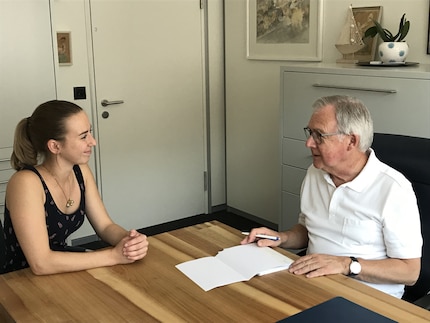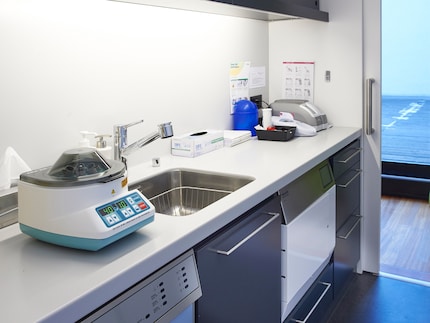
Guide
Want to have children? Tips from a gynaecologist
by Myrtha Brunner

The proportion of women among gynaecologists has risen from 5 per cent to 80 per cent. Dr Hanspeter Vogt is a specialist in gynaecology and obstetrics and has lived through this change. He tells us how circumstances and behaviour towards pregnancy have changed.
For many women, the annual check-up at the gynaecologist is more of a tragedy than a dance of joy. At least I have yet to meet anyone who enjoys sitting in that chair and spreading their legs. Women do it because it has to be done. I don't think this fact has changed in the last few decades. But it seems that it used to be normal for women to go to the uncle doctor and not the aunt doctor. Today it's more like: "What are you going to a man for?" Thanks to the answer to the first question I asked Dr Hanspeter Vogt, I now realise why. Just 1/5 of all gynaecologists today are men!

You have been working as a specialist in gynaecology and obstetrics for 34 years. How has the role of men changed in recent years or decades?
Dr Hanspeter Vogt: When I started my training as a specialist in gynaecology and obstetrics in 1981, only 5 per cent of doctors in Switzerland were women. Today, the proportion of women has risen to 80 per cent. Most female doctors in our speciality are mothers and work part-time. In this context, the role of men has changed considerably. The discipline as a whole has changed and is subject to constant change. The gender role is adapting to this change.
Fears and worries about pregnancy were certainly just as present in the past as they are today. But are they the same or have they changed?
No, the fears have remained the same. But the fear of dying in childbirth has receded into the background. Expectations have changed. Unforeseen events are no longer perceived as fateful. When complications arise, people immediately look for someone to blame. Our liability premiums have just been raised from 10 to 20 million. Although a doctor never has malicious intent, he is immediately accused of criminal behaviour when complications arise that cannot be averted. I believe that politicians should ensure that we are not automatically prosecuted. Unfortunately, the reality is different. And nothing is moving!
«The risk of complications increases with age, especially in women over 40, if they have concomitant diseases or engage in risky behaviour.»
The availability of information has increased immensely thanks to Google and various specialist websites. Are couples nowadays more concerned with pregnancy in advance?
No, I haven't particularly noticed that things have changed. Social media and apps are of course fascinating opportunities and they are being utilised.
Many women are afraid to talk to Family members or friends about when a pregnancy doesn't work out or a miscarriage has occurred. Why is this often still a taboo topic?I think that who a woman talks to about her unfulfilled desire to have children is a personal matter and has to do with privacy. Taboo actually means not talking about it at all. In the age of social media, that no longer seems to me to be the case.
A number of online sites show that high-risk pregnancies have increased in recent years. Mainly because women are increasingly having children at a later age. Do you agree with this?
Yes, that is a fact. The trend in this direction is a social phenomenon and cannot be stopped. The risk of complications increases with age, especially in women over 40, if there are concomitant illnesses or risky behaviours. The risk of miscarriages and malformations also increases with age. Women with a postponed desire to have children are aware of these facts. Nevertheless, they want to get through their education, job and career first before having children.
In contrast, what is the situation with medicine, does it adapt to the circumstances or does it lag behind?
Medicine always adapts to the circumstances. It is a challenge for our discipline!

Older women have told me that they used to drink a glass of wine during pregnancy. Even today, there are still women who don't give up alcohol completely. What is your opinion on alcohol during pregnancy?
Alcohol is a poison. A single dose of alcohol can damage the foetus in the womb, but not necessarily. This is not predictable. Damage always occurs when there is chronic alcohol consumption. It is advisable to avoid alcohol during the entire pregnancy.
How problematic is it if a woman consumes alcohol in the first three months because she does not (yet) know that she is pregnant?
Fortunately, nature is good-natured. Unexpected or unwanted harm rarely occurs. Nature often makes uncompromising decisions. It acts according to the "all or nothing law". If damage occurs, the fruit dies, if nothing happens, the pregnancy continues normally. Otherwise the human race would probably have died out long ago. A woman who does not use contraception is on the safe side if she abstains from alcohol from the time she wants to have children.
I recommend my last article to all women who are starting the "baby" project now or in the next few months. Dr Hanspeter Vogt gives some tips on what you should look out for.
Hanspeter Vogt, MD, has been a specialist in gynaecology and obstetrics since 1985. In his early years, he worked as a senior consultant at the gynaecological clinic of Münsterlingen Cantonal Hospital in the canton of Thurgau. He then became head of the gynaecological clinic at SRO AG Hospital in Langenthal (BE). He continues to pursue his passion even after his post as head physician. He opened the gynaecological practice Talstrasse in Langenthal and continues to be an attending physician at SRO AG Hospital.

Follow my author profile and you won't miss any future tips, tricks and topics relating to babies and toddlers.
I’m the cook, cleaner, police officer, nurse, entertainer, motivator, author, storyteller, coach, organiser, chauffeur, lawyer and judge. To put it simply, I’m a mum to a daughter and not just a (Content) Manager at the office but also at home.
Practical solutions for everyday problems with technology, household hacks and much more.
Show all